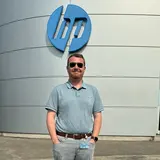Internship Spotlight: Kevin Moss ’24, Connecticut Green Bank
Kevin Moss ’24 on helping the Connecticut Green Bank develop a strategy to support priority clean transportation technologies.
We asked rising second-year MBA students to check in from their summer internships, where they are applying the lessons of their first year at Yale SOM.

Kevin Moss ’24
Internship: Connecticut Green Bank, Hartford, Connecticut
Hometown: Washington, D.C.
Pronouns: he/him/his
Clubs and Affiliations: Energy Club, Consulting Club, WiLD
Favorite SOM Class: State & Society
Favorite SOM Professor: Lorenzo Caliendo
Favorite New Haven eatery: Atticus Market, particularly for the weekend pizza
Favorite thing you do in New Haven or at SOM to unwind: Take my dog for walks in East Rock Park
Favorite Yale study space: fourth Floor of Evans Hall
I’m working for the Connecticut Green Bank, a quasi-state agency focused on accelerating clean energy technology deployment by leveraging limited public dollars to attract private capital. In my role, I’ve helped the Green Bank develop a strategy to support priority clean transportation technologies, mainly electric vehicle (EV) charging infrastructure and battery electric school buses.
The passage of the Connecticut Clean Air Act in 2022 committed the state to a suite of statutory clean transportation targets, including deploying approximately 2,000 electric school buses to school districts in environmental justice communities by 2030. Much of my work has focused on assessing these state targets, the associated financial barriers, and how the Green Bank can design financing products and build strategic partnerships to help the state meet its goals.
The Green Bank has committed to ensuring that at least 40% of its investments support communities that are disproportionately harmed by climate change. Applying creative financial thinking to drive positive social impact is one of my favorite aspects of working at the Green Bank.

Before SOM, I managed energy and environmental policy for the Western Governors’ Association, a bipartisan public policy organization in Denver, Colorado. My policy background has been incredibly useful at the Green Bank, as my first project was to conduct a landscape analysis of all the federal, state, and utility polices, regulations, and programs that affect the EV charging market in Connecticut. This task enabled me to build relationships with key public and private sector partners to evaluate how the Green Bank could integrate its products with various EV charging use cases.
As the summer progressed, I found myself frequently relying on the knowledge and skills I developed in my first year at SOM. Aside from leveraging lessons from the core curriculum and my improved understanding of business practices, I utilized many of the financial modeling skills I developed through Renewable Energy Project Finance (REPF), a hallmark class cross-listed with the Yale School of the Environment (YSE).
Taking REPF enabled me to develop financial analyses, including a battery electric school bus total cost of ownership (TCO) model, to assess the financing environment for various clean transportation projects across the state. My research has helped inform the Green Bank’s clean transportation strategy and engagement with the Greenhouse Gas Reduction Fund, a $27 billion program created by the Inflation Reduction Act.
Through these experiences, I have learned how to effectively integrate my past public policy experience with financial analysis and market strategy, a key goal when I began my MBA journey at SOM.
One of my favorite aspects of my internship this summer has been the opportunity to engage in Yale’s incredibly strong clean energy community. For example, I attended the inaugural Yale Innovation Conference, hosted by Yale Ventures, where I met Dan Gross, a 1998 graduate of both SOM and YSE and director of the Amazon Climate Pledge Fund, and Elliot Mainzer, also a member of the SOM and YSE Class of 1998 and president and CEO of the California Independent System Operator. The Green Bank also has strong SOM and Yale representation, including my supervisor, Sara Harari, a 2019 graduate of SOM and YSE, and CEO Bryan Garci, YSE Class of 2000. I also chat frequently with Burr Tweedy, a 2020 graduate of SOM and YSE, as he leads the New York Green Bank’s work on clean transportation and EVs.
I would encourage future MBA student to explore internship opportunities within Connecticut and consider lifestyle benefits when weighing summer internship opportunities. Working for an organization in Hartford allowed me to remain in New Haven for the summer, which was great in terms of building community and minimizing moving costs and logistical headaches.
I would like to thank the Connecticut Green Bank for an outstanding summer and am looking forward to continuing to work with them throughout the academic year.



